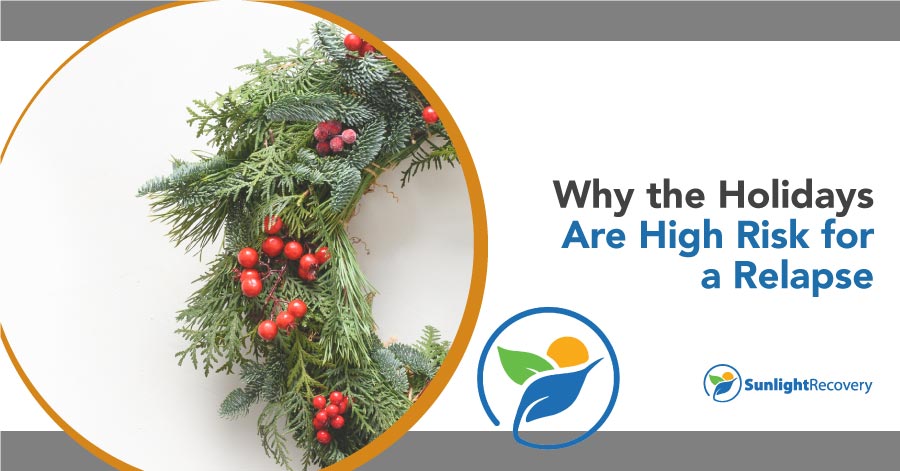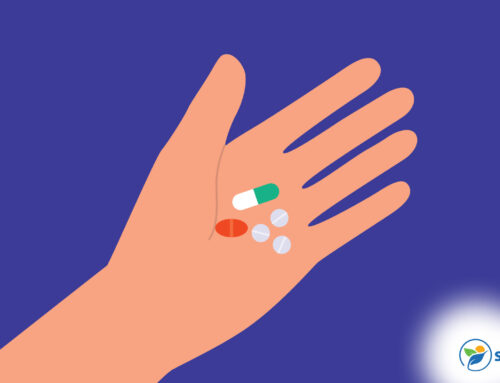Whether you’re a fully recovered addict or just beginning your recovery, the holidays are difficult for anyone with a substance abuse problem. Around every corner are plenty of high-risk situations for relapse. This guide reviews some issues that make holidays in recovery challenging and how you can create a holiday relapse prevention plan to cope with these triggers.
High-Risk Situations for Relapse
While recovery is a constant struggle, the holidays are particularly stressful, and stress and relapse tend to go hand in hand. Knowing what to look out for can help you formulate holiday relapse prevention strategies.
The Family Factor
While some people find comfort in their families when spending the holiday in recovery, others must face old traumas and unrealistic expectations that led them to abuse drugs or alcohol in the first place. When returning home to your family, you may be forced to confront many of your past demons, adding stress and anxiety to your trip.
If you make your family aware of your recovery during the holidays, they may offer a mixture of support, judgment and condemnation. For this reason, many recovering addicts agree that visiting their families at the end of the year is more stressful than usual. Our closest relatives can also have expectations that we fail to live up to when it’s apparent we’ve struggled with substance abuse.
Visiting Old Neighborhoods
When people return home, they can immerse themselves in environments that may have led them down dark paths in the past. Revisiting your old stomping grounds can be triggering and tempt you to fall back into old habits when revisiting memories with childhood friends.
Some of these people may not be the best influences, and they could even attempt to pressure you when you’re making a serious effort to make a positive change. Be mindful of places you need to avoid when you return home during the holidays.
People You Depend on Are Busier
Many former addicts can attest that the holidays and recovery efforts don’t mix well because the people they often lean on are unavailable. Whether it’s tight deadlines at work, travel plans or their own families, the people we depend on can be distracted by other things. This can be disheartening when we feel more pressure to relapse and don’t know where to turn for help.
To ensure you have support during the holidays, find out who’ll be available to lean on during the fall and note them in your holiday relapse prevention plan. Also remember that you can always contact professionals when you feel no one else can help.
Changes in Routine
Many individuals in recovery depend on consistency and schedules to avoid a relapse. The slower pace and relaxed environment of the holidays can be a hindrance. On a daily basis, try to stick to your routine as much as possible instead of having entire days out of the norm.
Cold Weather and Stress
You might suffer from seasonal affective disorder (SAD) and experience increased feelings of depression or anxiety during the winter months. When compounded with the other holiday pressures and stress, it can be easy to go down the dark path rather than see the light at the end of the tunnel. Symptoms of SAD include:
- Eating more often and gaining weight due to poor dietary choices
- Feeling weighed down throughout the day and as though everything requires more effort
- Sleeping much later than normal or needing to nap several times during the day
- Feeling angry or irritable more often or for illogical reasons
- Dealing with thoughts of suicidal ideation
If your addiction is linked to a dual diagnosis, SAD can make it more difficult for you to stay on track during the holidays. It’s important to investigate whether you have SAD and what coping skills you can develop to help you treat your mental health condition along with your temptation to use drugs or alcohol.
Grief
Holidays usually involve gatherings with all your friends and family. Losing a family member, whether to death or estrangement, can leave a hole in your life that can affect those moments. While it’s common for people to grieve over the holidays, it can be especially difficult for those in recovery.
Exposure to Substances
One of the most difficult things about holidays for anyone in recovery is the parties. Your family and friends may not make concessions to make it easier for you, such as refusing to serve alcohol at the event. When you’re watching other people enjoy something you’re trying to avoid, you can feel pressured to join in.
Your family and friends might add insult to injury by judging you when you refuse a drink. Instead of feeling validated and supported for doing the right thing, you could feel shame that you’re in recovery. You may compensate by overeating instead or experience anxiety, depression or mania. Don’t be afraid to ask your friends and families in advance to avoid serving alcohol at their parties.
Why You Need a Holiday Relapse Prevention Plan
A holiday relapse prevention plan acknowledges your triggers and creates an action plan to take them on during the holidays. Everyone has different triggers that make them seek drugs or alcohol to cope, so start with identifying yours. It could be your overbearing, judgmental uncle, a bar in your childhood neighborhood or missing your brother’s smiling face across the dinner table. If something seems like a potential trigger, write it down so you can create a plan for confronting it.
Give Yourself Enough Time to Plan
You shouldn’t wait until snow is on the ground and your bags are packed to think about your plan. Give yourself plenty of time to write it down — in case your initial action plan falls through, you’ll have plenty of contingencies.
Put It in Writing
When you put your plan in writing, you’re not just making sure you can refer to it later. You’re committing to following through with it, and you’ll be more likely to remember the things you’ve written down. If challenged, you can also pick up the paper and read it back to yourself for extra encouragement.
Create a Response for Each Trigger
Some triggers are easier to ignore, while others may be unavoidable. Think of coping mechanisms you’ve learned and how they apply to each potential situation. Is there an alternative activity you can focus on or someone you can speak to who’ll be more understanding? Use this knowledge to make your plans.
Lean on Your Support System
Even though your most ardent supporters may be busier during the holidays, determine who you can depend on when you’re at risk of relapsing. Ask around to see who’s a phone call away when you need it. If you can’t get hold of your supportive friends, have a professional’s phone number as a backup.
Get Through This Holiday Season With Confidence
The holidays can be tough for anyone with an addiction or underlying mental health problems. Contact Sunlight Recovery to learn how we can help you get through the holidays and any other difficult seasons of life.






